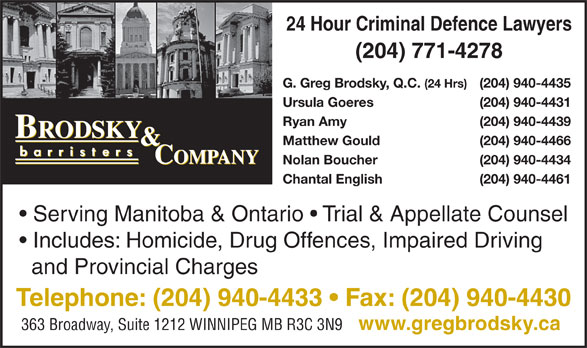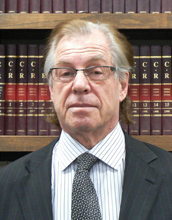- First President of the Manitoba Trial Lawyers’ Association (now known as the Criminal Defence Lawyers’ Association), 1976-1983
- Founding member and past President, Manitoba Medico-Legal Society
- Chairman, Manitoba Justice Section, Canadian Bar Association, 1969-1971
- Chairman, Criminal Justice Section, Canadian Bar Association, 1973-1974, 1980-1983
- Chairman, Judicial Committee, Law Society of Manitoba, 1981-1982
- Chairman, Legal Aid Liaison Committee, Law Society of Manitoba, 1982-1983
- Chairman, Discipline Committee, Law Society of Manitoba, 1979-1981
- Chairman, Lawyer Referral, Law Phone-in, Law Society of Manitoba, 1981
- Chairman, Ethics Committee, Law Society of Manitoba, 1984-1985
- Past President, Skills Unlimited
- Past President, Shaarey Zedek Synagogue
- Director, Sair Centre of Learning
- Life Bencher, Law Society of Manitoba
24-Hour Emergency Line: (204)771-4278
Why Choose Us?
Brodsky & Company combines the knowledge and expertise of five creative, talented and progressive lawyers. Backed by a staff of students and administrative support, our lawyers work as a litigation team, undertaking a detailed and thorough investigation of your case to identify and pursue all legal and factual issues and opportunities. Although you are assigned an individual lawyer, you will be able to interact with the entire litigation team throughout the various stages of your case, during meetings, bail applications, court appearances and trials.
We take pride in our responsiveness and try to communicate with our clients at least once a week. Most importantly, we focus on each individual case and client. We understand the implications of criminal action and we work with you to understand your situation and your goals.
Overall, our philosophy is to focus on providing responsive service and sophisticated strategies to achieve the desired results for our clients. Our commitment to hard work and excellence has lead to success in every level of the Canadian judicial system, including precedent setting cases in the Supreme Court of Canada.
What Are Your Rights?
Everyone has the following rights if questioned or arrested by the police:
The Right to Remain Silent
If the police question you regarding your alleged involvement in a criminal offence, you have the legal right to remain silent. Your right not to speak to the police when questioned is part of your fundamental right to be free from self-incrimination, that is, to not provide the police with evidence which may be used against you.
You are under a duty to identify yourself to the police by giving them your name, and in some circumstances, your birth date and address. If you do identify yourself to the police do not lie. Lying to the police in the course of an investigation is a criminal offence and if your charges go to trial, you initial lies can damage your creditability. If you refuse to identify yourself to the police, they can hold you in custody for the purposes of determining who you are.
The police are required to advise you of your right to remain silent. The reason for the right to silence is to give you the opportunity to speak to a lawyer and then make a free and meaningful choice about whether to speak. After speaking with the lawyer the police can continue to ask you anything they want without the presence of a lawyer. The police do not have to tell you the truth. They can lie or embellish evidence. They can claim there are witnesses that do not exist. They may say they “know” that you did the crime with which you are charged, and it would be easier if you just confessed. During this questioning, you can and should continue to exercise your right to remain silent.
The Right to Retain and Instruct Counsel Without Delay
Section 10 of the Canadian Charter of Rights and Freedoms (http://laws.justice.gc.ca/en/charter/#juridiques) provides that everyone upon arrest and detention has the right to be promptly informed of the reasons for their detention and to retain and instruct a criminal lawyer without delay, and to be informed of that right.
When detained, you have the ability to contact a lawyer of your choice. You should always take the opportunity to speak with a lawyer first before speaking with the police, providing a breathalyzer sample, or complying with any other request the police may have in attempting to further their investigation or collect evidence. If you are in custody, you can contact our 24-hour on call lawyer at (204) 771-4278. If you do not wish to contact a private lawyer, you may speak with legal aid duty council, available on a 24-hour basis.
The Right to Be Free From Unreasonable Search and Seizure
In order to be reasonable under the Charter of Rights and Freedoms a search must be authorized by law, and the law itself must be reasonable. The search must also be conducted in a reasonable manner.
If the search is made in violation of this right, often the evidence obtained cannot be used against you.
The Right to an Interpreter
If English is not your first language, be very careful in your conversations with the police. Insist on being provided with an interpreter.
**You are entitled to ask for legal help when called in for questioning, or arrested by the police. Contact us any time of the day or night at (204) 771-4278, or ask the police to contact Greg Brodsky and a member of our litigation team will be there to protect your best interests.




